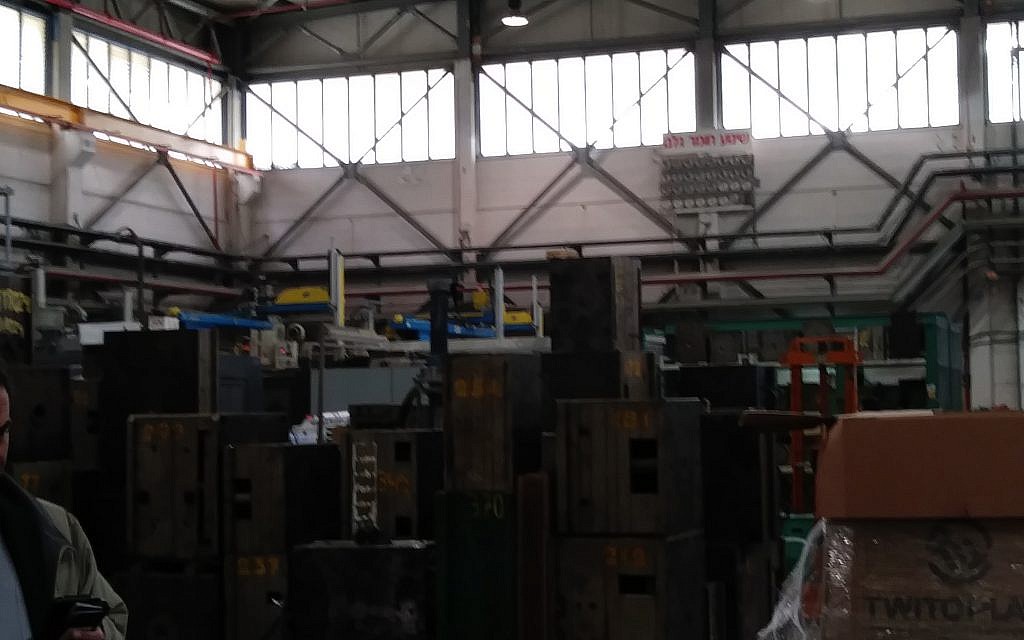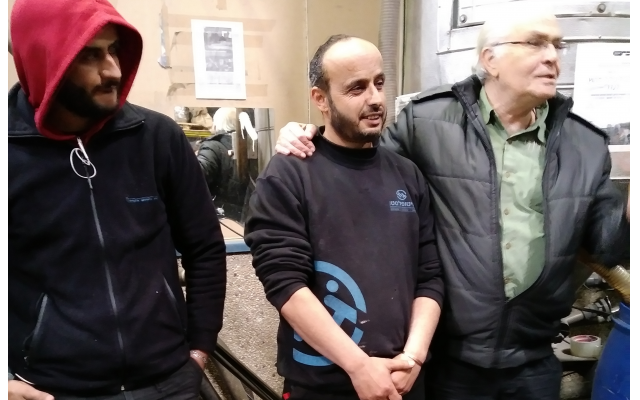Barkan Industrial Park Challenges BDS Movement
Twitoplast, a factory in what is known as the West Bank, is one of 146 factories in the Barkan Industrial Park that provides work for Palestinians.
Patrice Worthy is a contributor at the Atlanta Jewish Times.
At Twitoplast, a factory in what is known as the West Bank, Israel Twito gives the AJT a tour. His is one of 146 factories in the Barkan Industrial Park that provides work for Palestinians.
“Peace can only be achieved through economics. We leave religion and politics out of it,” Twito says. “To us it’s about the people.”
Twito employs Palestinians, Druze and Israelis. Palestinian workers make about 5,000 shekels a month, the equivalent of about $1,060. It’s not a lot of money, but it’s a start compared to the $200 to $300 a month the Palestinians get paid under the Palestinian Authority, he said. It has been reported by Kav LaOved, an Israeli workers’ rights organization, that Palestinian workers make $2 to $4 per hour, well under the $5.75 Israeli minimum wage.
Despite that, there are workers who have been employed with Twitoplast for more than 20 years. Many of the Palestinian workers who work for Twito told the AJT that most of their neighbors want to come work for him.
The factories allow Palestinians, many of whom live in multi-generational homes, to increase their standard of living. “A Palestinian worker has about 10 mouths to feed,” Twito said. And working in one of many factories in the industrial zone is very beneficial to a family.
As he tours the facility, he introduces the AJT to a Palestinian man whose son was just hired last week. For them, working in what many call the West Bank and what is now being referred to as Judea and Samaria or the “Somorom” region, is the beginning of economic mobility for Palestinians in the region. It is part of a strategy embraced by many businessmen who work side-by-side with members of the Arab community and say they see the progress firsthand.
George Schaeffer, founder of OPI nail polish and major donor to Bnai Zion Foundation, an organization that funds capital projects in Israel, said he supports an economic strategy that includes Palestinians because when everyone eats, everyone wins.
“There is a golden harvest here that can benefit everyone,” Schaeffer said. “That is why I support Bnai Zion and the economics because it’s about taking care of Israelis no matter race, religion, or economic status; we leave the politics out of it.”

But Twito worries the BDS movement, or Boycott, Divestment, Sanctions movement, will successfully put an end to what he says is more progress in Palestinian-Israeli relations than what has been made in the past. The BDS movement specifically targets Israeli products and projects as a way to discourage and end Israeli settlements in the West Bank. As a response to what some call the Israeli massacre of Palestinians in 2014, BDS has stopped production of a light rail from Jerusalem to the West Bank following a seven-year boycott of French corporation Veolia.
According to www.BDSmovement.net, “The 400,000 Israeli settlers who moved there “act largely with impunity” even if they are caught torching Palestinian fields and olive groves and damaging crops and property or hurling Molotov cocktails or using live fire against Palestinians.
Israel has come under fire by the EU for creating more settlements in the West Bank in Area C, which is 60 percent of the region and contains its most fertile soil. Area C was also reserved as the primary land for Palestinians.
But Twito said the BDS movement is showing one side of the argument. According to him, more than 100,000 Palestinians walk to work every day and the light rail could have helped.
“We are creating more peace here in the industrial zones than anywhere else in Israel, because we pay Palestinians salaries,” Twito said. “If you want peace, you have to start with economics.”
Palestinians are some of the most educated in the Arab world, ranking number three in literacy. However, many also live in extreme poverty in the Gaza Strip and West Bank. It’s a crisis Yuli Edelstein, speaker of the Knesset, wants to see come to an end as Israelis look to the future. Edelstein said the industrial zones are creating peace and it’s not sitting well with others who take advantage of the conflict.
“The industrial zones are achieving peace and you know who else knows that? Hamas. They have started attacking the industrial zones because they know that’s where Israelis and Arabs are working together,” Edelstein said.
In October of 2018 two Israeli workers were stabbed by a Palestinian, but that is the only reported attack in the Barkan industrial zone, which many say is a testament to Israeli-Palestinian relations.
Benny Kashriel, mayor of Ma’aleh Adumim, believes it’s a matter of meeting the needs of the people. When the town was established it caused controversy due to its location in the West Bank. Now, Ma’aleh Adumim is a prime destination for young professionals to settle down. Many Palestinians work and live in the city and Kashriel said he’s proud to have peace in his region.
“We have no fences and no walls,” he said. “When you talk to the people and not the leaders then you can achieve peace.”
Patrice Worthy is an AJT correspondent reporting from Israel.




comments